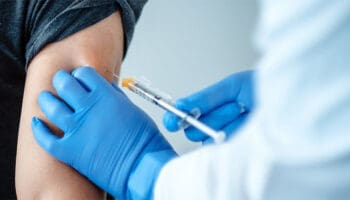If the Pfizer-developed antiviral pill performs as well as other antivirals, it may be a game changer. It was 85 percent effective when taken within five days of symptoms. If all goes well, the drug could be approved by the F.D.A. by year’s end. Scientists have long dreamed of convenient and affordable ways to combat this pandemic. In an ideal world, it would be possible to obtain the pills at a local drug store or from any doctor.

Molnupiravir
Unlike the Omicron treatment, the molnupiravir in RedHill’s pill showed promising results in a small study. Although it had a much smaller effect in the large trial, the molnupiravir was still effective and its effectiveness dropped from 50 percent to 30 percent in the final analysis. The findings are a positive sign as treatment use spreads worldwide.
Merck, also known as MSD outside the U.S. and Canada, has announced the results of six preclinical studies involving molnupiravir, an investigational COVID-19 medicine. The new pill showed promise in inhibiting the replication of a newly identified variant of COVID-19, called Omicron (B1.1.529).
Scientists hope the new pill will perform better than the current antiviral drug, Omicron. The drug was 85 percent effective when taken within five days of developing symptoms. Eventually, the F.D.A. is expected to approve the pill. As soon as this drug is approved, the pill may be used to treat the epidemic. It will reduce the chances of death and hospitalization by up to 30%.
Merck and the Medicines Patent Pool have agreed to speed up global access to molnupiravir. Merck will produce up to 10 million courses of treatment to meet the global demand. The companies have also entered into supply agreements with government agencies and UNICEF to increase the supply of the drug. The drug will be available in more than 100 countries once local regulatory approvals are obtained.
The drug’s dual antiviral and anti-inflammatory effects have made it a good candidate for COVID-19 treatment. It showed strong efficacy in the in vitro test against the omicron variant while maintaining host cell viability. The mechanism by which it works appears to be independent of viral spike protein mutations. Moreover, opaganib treatment also increased the median time to viral RNA clearance.
Despite the limited clinical data, molnupiravir in RedHill’s pill shows potential against both Omicron and Delta. However, it’s still too early to judge whether this new treatment will improve overall health. Given that there are still no human studies on molnupiravir, it’s still better than Omicron, but only if the risks are mitigated.
Opaganib
A new experimental drug for COVID-19 has shown promising results in a randomized trial of people who were previously infected with earlier versions of the coronavirus. It is now being evaluated in humans and has shown promise versus the Omicron variant in test tube experiments. Here’s a look at how the drug works. Firstly, it reduces inflammation in patients by up to 80%. Then, it also reduces the risk of death and hospitalization in the study.
The antiviral and anti-inflammatory effects of opaganib are expected to work independently of viral spike macromolecule mutations. This should mean that opaganib remains effective against Omicron subvariants and future variants. The drug also suppresses viral replication, which is good news for people with HIV. However, it will be important to note that the drug is not yet approved by the U.S. Food and Drug Administration.
Moreover, the drug possesses the ability to neutralize the omicron subvariant, which is responsible for about 95% of current cases. The company also released lab results showing that its experimental monoclonal antibody treatments neutralized several variants of the disease. These results are encouraging because opaganib can be used to prevent infection in immunocompromised people.
A recent report by the World Health Organization has indicated that the BA.2 variant of omicron is responsible for approximately 11.6% of U.S. coronavirus outbreaks, according to Reuters. Other omicron subvariants are responsible for 73.7% and 14.7% of circulating cases, according to the CDC. Nevertheless, despite these numbers, the trend appears to be stabilizing.
Meanwhile, Pfizer’s Paxlovid has been halted in South Korea, and the Korean government is seeking an alternative. Merck’s Lagebrio is set to begin distribution in South Korea this weekend. Previously, Celltrion’s Regkirona was removed from the market after the FDA’s ruling on omicron.
Pfizer’s Paxlovid antiviral has shown promising results against the omicron variant. Three independent studies of the drug have confirmed the results. However, monoclonal antibodies are ineffective against omicron. Merck and Ridgeback have agreed to donate 3 million courses of COVID-19 to UNICEF by the end of 2022. By 2023, Merck plans to make 20 million courses of COVID-19.
Pfizer and BioNTech have also released data from two lab studies with 51 people. Although the vaccine does not prevent COVID-19 infection, the two doses of the drug seem to induce immunity against the disease. After one month, samples were collected for the study. After the third dose, the antibody levels against omicron were 22-fold higher. Then, they decreased by similar amounts. The findings are promising, but further studies will be needed before the drug is approved for use in the United States.
The trial was delayed due to heavy enrollment, but results are promising. The drug is highly effective against the delta variant of COVID. However, when the omicron variant became dominant, some vaccinated children contracted the disease. Despite this setback, Pfizer-BioNTech hopes to have a vaccine ready next month and a three-dose regimen for COVID patients.
Covid-19
The new RedHill pill shows promising results in trials against a variant of the coronavirus. The new treatment is already being tested in clinical settings, but some researchers hope that the pill will work better than the previous versions. It was found to reduce the risk of hospitalization and death by up to 30 percent. Scientists hope that the pill will become available to the general public in the near future.
The drug, Opaganib, has antiviral and anti-inflammatory properties and is believed to enact independently of changes in viral spike macromolecules. It is also expected to be effective against future and subvariants of Omicron. The company announced on Monday that the drug had prevented viral particles from reproducing in laboratory tests. The data are promising, and will help the company further develop its product.
One study found that those with well-controlled HIV infections had similar immune responses to the COVID-19 mRNA vaccine. The companies behind the vaccines are Moderna and Pfizer/BioNTech. These results are important because COVID-19 patients are often inappropriately treated with steroids and antibiotics. Vaccines are a great way to protect yourself from this scourge.
Reuters


